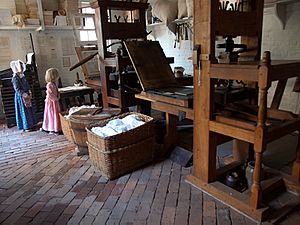Ann Timothy facts for kids
Quick facts for kids
Ann Timothy
|
|
|---|---|
| Born |
Ann Donovan
circa 1727 |
| Died | September 11, 1792 Charleston, South Carolina, US
|
| Nationality | American |
| Occupation | Newspaper publisher |
| Known for | One of the few women newspaper printers in Colonial America |
| Spouse(s) | Peter Timothy |
| Relatives | Elizabeth Timothy (mother-in-law) |
Ann Timothy (born around 1727 – died September 11, 1792) was an important newspaper publisher from South Carolina. She worked closely with her husband, Peter Timothy, for many years. After he passed away in 1782, Ann took over the business. She became the official printer for the state of South Carolina, which was a very important job at the time.
Contents
Early Life and Family
Ann Donovan was born around 1727. She married Peter Timothy on December 8, 1745, in Charleston, South Carolina. Peter's mother was Elizabeth Timothy, who ran the first regular newspaper in South Carolina. This shows that printing was a family business for them!
Ann and Peter had many children, possibly as many as fifteen. Sadly, seven of them died when they were babies. Some of their children who grew up included Elizabeth-Ann, Frances-Claudia, Anne, Sarah, Robert, and Benjamin Franklin.
A Career in Printing
Ann and her husband, Peter, took over the South Carolina Gazette newspaper. Peter's mother, Elizabeth Timothy, had run it before them.
In 1772, Peter wrote to Benjamin Franklin that his eyesight was getting bad. He said he might not be able to print the newspaper anymore. The newspaper sometimes stopped printing, like when a fire destroyed their printing press.
Printing the Declaration of Independence
After the United States Declaration of Independence was signed in 1776, Peter printed copies of it. These copies were called "broadsides." They were large sheets of paper meant to be hung in public places. Peter wanted to show his support for the American Revolution. He added "CHARLES-TOWN, Printed by PETER TIMOTHY" at the bottom of the document. This was a brave step for printers across the country.
Challenges During the Revolution
In February 1780, the newspaper stopped printing again. The British army was getting close to Charleston. This led to the Siege of Charleston, where the city was surrounded. Peter was captured by the British. He was sent to a prison in St. Augustine, Florida, for ten months. He was punished for not promising loyalty to the British king. After his release, he could not go back to Charleston right away.
In 1782, Peter sailed for Santo Domingo in the Caribbean. Two of his daughters and a grandchild were supposed to meet him. They planned to travel to Antigua to visit another daughter. Sadly, they all died during a storm off the coast of Delaware. At this time, Ann and Peter's surviving children were Sarah, Robert, and Benjamin Franklin Timothy.
Ann Takes Charge
Ann Timothy started printing the newspaper again on July 16, 1783. This was after Peter's death and after the British left Charleston. The newspaper was printed from the John Lining House on Broad Street.
From 1785 until her death in 1792, Ann Timothy held a very important position. She was the official "Printer to the State" of South Carolina. This meant she printed all official government documents. When she died in 1792, people said she was a very worthy and valuable person. Her son, Benjamin Franklin Timothy, continued the family printing business.
Legacy and Importance
Ann Timothy was one of only a few women who published newspapers before and after the American Revolution. Printing was often a family business that passed down through generations. In some families, like Ann's, two or more generations of women were printers. Ann's mother-in-law, Elizabeth Timothy, was also a printer.
It was often necessary for women who became widows to keep their family's printing business going. Ann Timothy was one of at least six women who were official printers for colonial governments. These women often used their newspapers to support the American cause. Their writings helped to inspire patriotism among the people.
See Also
 | James B. Knighten |
 | Azellia White |
 | Willa Brown |


